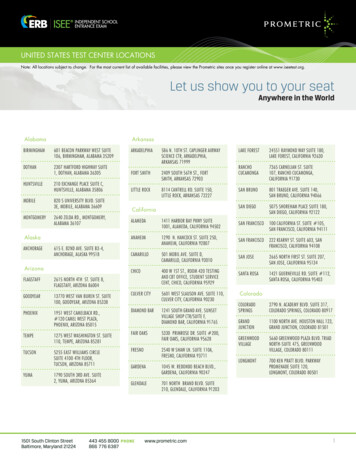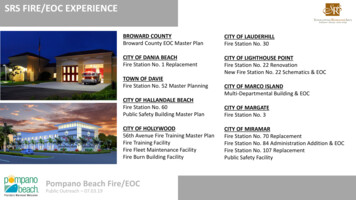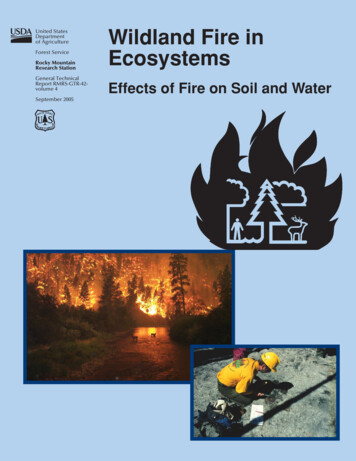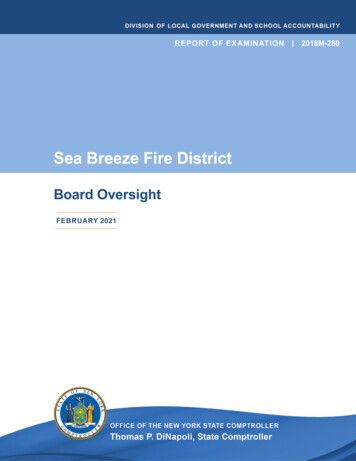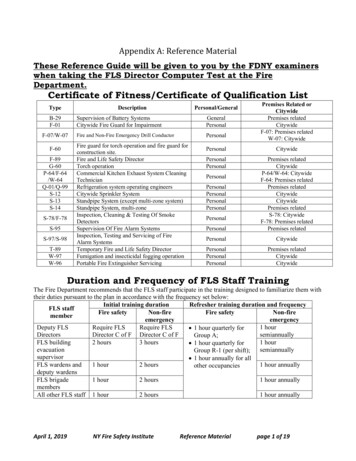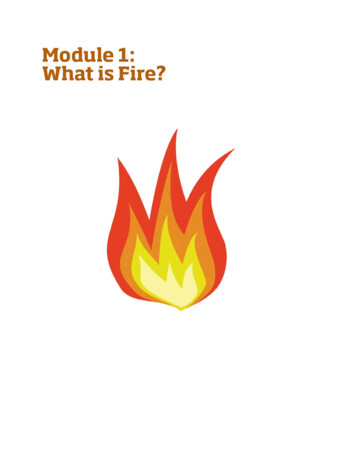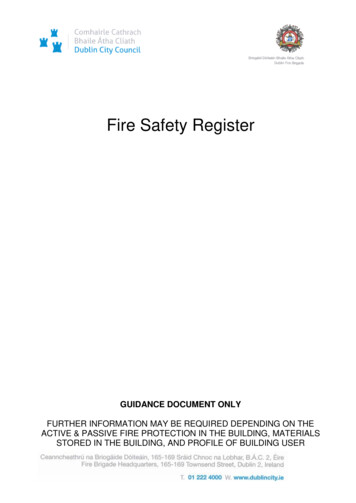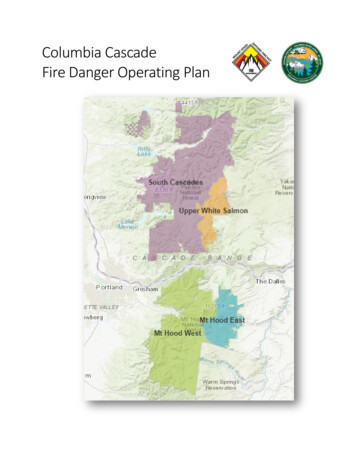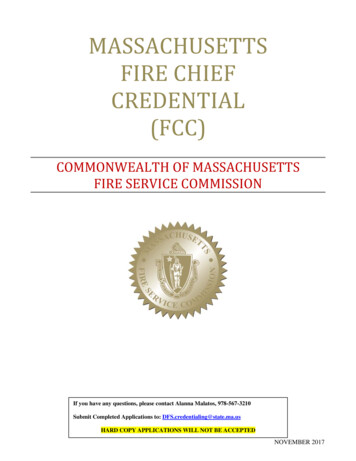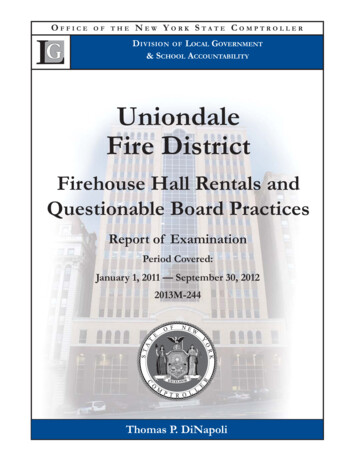
Transcription
OFFICEOF THENEW YORK STATE COMPTROLLERD IVISION OF LOCAL GOVERNMENT& SCHOOL ACCOUNTABILITYUniondaleFire DistrictFirehouse Hall Rentals andQuestionable Board PracticesReport of ExaminationPeriod Covered:January 1, 2011 — September 30, 20122013M-244Thomas P. DiNapoli
Table of ContentsPageAUTHORITY LETTER2EXECUTIVE SUMMARY3INTRODUCTIONBackgroundObjectiveScope and MethodologyComments of District Officials and Corrective Action55556FIREHOUSE HALLRecommendations710QUESTIONABLE BOARD PRACTICESCredit CardsMeals and RefreshmentsCell PhonesVehicles and IXAPPENDIXAPPENDIX30353738ABCDResponse From District OfficialsAudit Methodology and StandardsHow to Obtain Additional Copies of the ReportLocal Regional Office ListingDIVISION OF LOCAL GOVERNMENT AND SCHOOL ACCOUNTABILITY11
State of New YorkOffice of the State ComptrollerDivision of Local Governmentand School AccountabilityMarch 2014Dear Fire District Officials:A top priority of the Office of the State Comptroller is to help local government officials managegovernment resources efficiently and effectively and, by so doing, provide accountability for taxdollars spent to support government operations. The Comptroller oversees the fiscal affairs of localgovernments statewide, as well as compliance with relevant statutes and observance of good businesspractices. This fiscal oversight is accomplished, in part, through our audits, which identify opportunitiesfor improving operations and Board of Fire Commissioners governance. Audits also can identifystrategies to reduce costs and to strengthen controls intended to safeguard local government assets.Following is a report of our audit of the Uniondale Fire District, entitled Firehouse Hall Rentals andQuestionable Board Practices. This audit was conducted pursuant to Article V, Section 1 of the StateConstitution and the State Comptroller’s authority as set forth in Article 3 of the General MunicipalLaw.This audit’s results and recommendations are resources for local government officials to use ineffectively managing operations and in meeting the expectations of their constituents. If you havequestions about this report, please feel free to contact the local regional office for your county, as listedat the end of this report.Respectfully submitted,Office of the State ComptrollerDivision of Local Governmentand School Accountability2OFFICE OF THE NEW YORK STATE COMPTROLLER
State of New YorkOffice of the State ComptrollerEXECUTIVE SUMMARYThe Uniondale Fire District (District) is a district corporation of the State, distinct and separate fromthe Town of Hempstead and the County of Nassau in which it is located. The District covers nearlythree square miles and services approximately 24,800 residents. An elected five-member Board ofFire Commissioners (Board) governs the District. The Board is responsible for the overall financialmanagement of the District, including establishing policies and internal controls to ensure that assetsare properly safeguarded. The District’s 2012 adopted general fund budget was 4.1 million, whichwas funded primarily with real property taxes.Scope and ObjectiveThe objective of our audit was to determine if the Board developed an adequate control environmentto protect taxpayer assets during the period of January 1, 2011 through September 30, 2012. Our auditaddressed the following related questions: Has the Board adopted appropriate policies and procedures over the use of the firehouse hall? Did the Board provide effective financial oversight and monitoring to protect District assets?Audit ResultsThe Board needs to improve its oversight of the District’s financial operations. The Board’s currentfirehouse hall rental policy and procedures are inadequate, and the Board did not comply with theprovisions in the existing policy. In addition, the Board did not review, approve, monitor or controlthe firehouse hall rental process. As a result, one Commissioner (Commissioner A) controlled allaspects of hall rentals, including taking and recording reservations for hall rentals, collecting rentalfees and depositing moneys in the District’s bank account. Because the Board did not properly overseetransactions related to the firehouse hall rental process, Commissioner A was able to rent the hall tovarious individuals and organizations and collect but not deposit any of the rental moneys generatedby these events. We calculated that approximately 43,800 in firehouse hall rental income is missing.The Board did not exercise appropriate oversight or establish sound policies and procedures related tocredit cards, cell phones, meal expenditures, vehicles and equipment. The District’s policies for creditcard use, meals and refreshments and cell phone usage were weak. Regardless, District personnel didnot comply with the existing policies, and the Board did not provide oversight to ensure that taxpayermoneys were used only for legitimate District business purposes. Not only did the Board fail to provideoversight in these areas, individual Board members themselves abused these District resources. OfDIVISION OF LOCAL GOVERNMENT AND SCHOOL ACCOUNTABILITY33
the 44,245 of credit card purchases that we identified as being questionable, 33,063 were made byCommissioner A. We also identified 5,923 in cell phone charges for services and equipment that didnot appear to be valid District expenditures. Another Commissioner was responsible for 1,360 ofthese charges. Additionally, the District spent 20,322 for meals that were not pre-approved by theBoard and that District officials could not provide documentation to indicate who participated in themeals or why they were necessary District expenditures.Finally, the District’s capital asset policy does not provide adequate guidance regarding appropriateinventory recordkeeping or vehicle and equipment usage and disposal. The District has more sportutility vehicles than appear to be necessary for appropriate District operations, seven of which wereeither not being used or were assigned to employees who did not need District-owned vehicles tofulfill their job responsibilities. Also, the Board did not provide any oversight over vehicle usage anddid not require District staff to track how and for what reasons they used these vehicles.Comments of District OfficialsThe results of our audit and recommendations have been discussed with District officials and theircomments, which appear in Appendix A, have been considered in preparing this report. District officialsgenerally agreed with our recommendations and indicated they planned to take corrective action.4OFFICE OF THE NEW YORK STATE COMPTROLLER
IntroductionBackgroundThe Uniondale Fire District (District) is a district corporation ofthe State, distinct and separate from the Town of Hempstead andNassau County in which it is located. The District covers nearlythree square miles and services approximately 24,800 residents withfour fire companies and one emergency services squad. All of theapproximately 126 members are volunteers. The District also has 12full-time employees (the District Supervisor, District Secretary, twomechanics, maintenance workers and a Fire Prevention Officer) andfour part-time employees.An elected five-member Board of Fire Commissioners (Board)governs the District and is responsible for the District’s overallfinancial management. The Board’s powers include approving theannual operating budget, adopting District policies, auditing Districtclaims and ordering the Treasurer to pay claims. The District’s 2012adopted general fund budget was 4.1 million, which was fundedprimarily with real property taxes.The District Treasurer (Treasurer) is the District’s chief fiscal officer,appointed by the Board, and is responsible for the receipt, custodyand disbursement of District funds. The District Secretary (Secretary)is responsible for recording the proceedings of Board meetings andretaining the District’s key administrative records. The DistrictSupervisor oversees the District’s maintenance staff and day-to-dayfirehouse operations.ObjectiveScope andMethodologyThe objective of our audit was to determine if the Board developedan adequate control environment to protect taxpayer assets duringthe period of January 1, 2011 through September 30, 2012. Our auditaddressed the following related questions: Has the Board adopted appropriate policies and proceduresover the use of the firehouse hall? Did the Board provide effective financial oversight andmonitoring to protect District assets?We examined the internal controls over the District’s financialoperations for the period January 1, 2011 through September 30,2012. We expanded our scope period to December 31, 2012 for theanalysis of firehouse hall rental revenue.DIVISION OF LOCAL GOVERNMENT AND SCHOOL ACCOUNTABILITY55
We conducted our audit in accordance with generally acceptedgovernment auditing standards (GAGAS). More information onsuch standards and the methodology used in performing this audit isincluded in Appendix B of this report.Comments ofDistrict Officials andCorrective ActionThe results of our audit and recommendations have been discussedwith District officials and their comments, which appear in AppendixA, have been considered in preparing this report. District officialsgenerally agreed with our recommendations and indicated theyplanned to take corrective action.The Board has the responsibility to initiate corrective action. Pursuantto Section 181-b of the Town Law, a written corrective action plan(CAP) that addresses the findings and recommendations in this reportmust be prepared and forwarded to our office within 90 days. To theextent practicable, implementation of the CAP must begin by the endof the next fiscal year. For more information on preparing and filingyour CAP, please refer to our brochure, Responding to an OSC AuditReport, which you received with the draft audit report. The Boardshould make the CAP available for public review in the Secretary’soffice.6OFFICE OF THE NEW YORK STATE COMPTROLLER
Firehouse HallThe Board is responsible for overseeing the District’s fiscal activitiesand safeguarding its resources. To fulfill this duty, it is essential thatthe Board establish a system of internal controls to ensure that theuse of taxpayer property is properly authorized and that Districtmoneys are protected and properly accounted for. Proper internalcontrols ensure that financial duties be adequately segregated,so that one individual does not control all phases of a transaction.When one person performs all duties related to collecting cash,recording the collections in the accounting system and depositingthe receipts into the bank, there is an increased risk that cash couldbe misappropriated without detection. If limited resources make itdifficult to segregate incompatible duties, District officials shouldprovide adequate oversight of the work performed by the individualwho has incompatible financial duties.According to Town Law, the District may use its firehouse to preserve,protect and store fire equipment and for the social and recreational useof the District’s members and residents. The District generally cannotrent its firehouse hall for private social functions that are not opento the general public.1 The Board must develop written policies andprocedures to monitor rental activity and protect District property.When renting its firehouse hall for events, the District may charge afee for the use of the premises to cover the expenses of cleaning andmaintenance.The District should ensure that all individuals and organizationswho rent the firehouse hall for an event sign a rental agreementthat includes the renter’s name and address, and the purpose of theevent. Also, it is important that the District ensure that renters obtainadequate liability insurance to protect taxpayer assets from potentialliabilities. The Board as a whole must approve these contracts andensure that its approval is recorded in the minutes of its proceedings.The Board should ensure that District staff issue cash receipts whenreceiving cash from hall renters and properly record and promptlydeposit all cash receipts. The Board also should review and approveall disbursements related to these events prior to payment by theTreasurer.The District firehouse includes a second floor hall with a kitchen. TheDistrict adopted a policy in January 2010 that allows the general public1The terms “rent” and “rentals” are used in this report for convenience to refer tothe arrangements for use of the firehouse hall, but not to describe the legal natureof those arrangements.DIVISION OF LOCAL GOVERNMENT AND SCHOOL ACCOUNTABILITY77
to rent the hall for 150 for events with less than 100 guests and 300for events with more than 100 guests, in the form of “cash only.” Thepolicy restricts the rental of the hall to once per year for UniondaleFire Department members and Uniondale-based organizations (suchas not-for-profit, political and religious-based organizations) andthree times per year for Chiefs and Commissioners.The Board did not comply with its own policy for firehouse hallrentals, and it did not review, approve, monitor or control the firehousehall rental process. As a result, one Commissioner (Commissioner A)controlled all aspects of hall rentals, including taking and recordingreservations for hall rentals, collecting rental fees and depositingmoneys in the District’s bank account. Because the Board did notproperly oversee transactions related to the firehouse hall rentalprocess, Commissioner A was able to rent the hall to various individualsand organizations and collect but not deposit any of the rental moneysgenerated by these events. We calculate that approximately 43,8002in firehouse hall rental income is missing.Because only one Commissioner controlled the hall rental process,the Board as a whole did not approve the rental agreements, andDistrict officials did not record any hall rental revenue in the District’saccounting records. District officials were unable to provide us withcomplete calendars used to record rental events. They provided uswith information for recorded events for seven months in 2011 butwere able to provide all 12 months in 2012. Although District officialstold us that the firehouse hall was used nearly every weekend, thecalendars did not reflect this level of activity. The calendars containednumerous erasures; 13 events in 2011 and 24 events in 2012 wereerased or crossed out on the calendars. District officials have no way ofknowing if the erasures were due to individuals and/or organizationsreserving and then canceling events, or if Commissioner A, who wascontrolling the hall rental process, had erased past events from thecalendars.The available hall rental records for our audit period included 22cash receipts3 totaling 4,875 and 30 rental application forms.Commissioner A had approved 28 of the 30 rental applicationswithout any Board approval or review and had collected all hallrental moneys from renters. Although Commissioner A did not haveauthority to receive or disburse District moneys, he told us that hehad used the money collected to pay those who worked at the events,which included cleaning up after events and directing traffic in thefirehouse parking lot. Commissioner A did not maintain an adequate238 28,950 for recorded events and 14,850 estimated for unrecorded eventsDistrict officials provided us with receipt books for a five-month period in 2011and could not provide us with any receipt books for 2012 for our review.OFFICE OF THE NEW YORK STATE COMPTROLLER
record of the money collected and did not record how he used themoney. Therefore, all moneys collected from the hall rentals remainunaccounted for.The District and taxpayers have no assurance that Commissioner Adid not misappropriate the moneys or inappropriately retain a portionfor working at the events. In addition, the District did not issue anyFederal 1099 forms or W-2 forms to report the earnings of those whoworked at these events to the Internal Revenue Service.Recorded Events – During our review of the available hall rentalrecords for 2011 and 2012, we identified 166 events written on thecalendars that were not erased. According to District personnel, theDistrict should have collected a fee for 126 of the 166 events. For 30of the 126 events, the District had application forms to indicate whorented the hall, who approved the rental and the amount paid. Also,District officials had seven cash receipts4 that indicated the amountpaid for seven additional events for which the District did not havea contract. The rental fees recorded on the receipts and applicationstotaled 5,475 for 2011 and 3,450 for 2012. For the remaining 89events, we estimated that the District could have collected about 20,025 (Table 1), for a total of 28,950.5Table 1: Hall Rental Fees 5,475 3,60042 9,450 18,52586 3,450 16,42524 5,400 25,275126 8,925 20,02566 14,850 43,80040aIncludes only seven months in 2011Recorded eventscUnrecorded eventsdWe used an estimate of 225 per event (an average of 150 and 300) for those events for which District officials did not have a rentalagreement or receipt.eIncludes five months that were missing from the events calendar in 2011 and events erased from the 2011 and 2012 calendarsbUnrecorded Events – To determine the income missing fromundocumented rental events during 2011 and 2012, we estimated thenumber of events that occurred during the five calendar months in 2011for which District officials could not locate records and included theevents that were erased from both calendars for a total of 66 events.45These seven receipts were included in the 22 cash receipts totaling 4,875 thatwere mentioned previously.We calculated this amount using an average of 225 per event for those events forwhich District officials did not have a receipt or application. This estimate couldrange between 22,275 (at 150 per event) and 35,625 (at 300 per event).DIVISION OF LOCAL GOVERNMENT AND SCHOOL ACCOUNTABILITY99
We estimate there was approximately 14,850 of missing rental feesfrom these unrecorded events (Table 1).6 Using a rate based on theseven months of available records in 2011 and multiplying throughoutthe year, we estimated Commissioner A may have collected about 43,800 in 2011 and 2012 for recorded and unrecorded events.In addition, we found that District officials did not follow theBoard-adopted policy regarding the use of the firehouse hall. Of the30 applications that were available, nine applicants did not have aUniondale address, which suggests that the District rented the hallto nonresidents. We also found that 41 of the 126 hall rental eventslisted on the calendars were for private parties, such as weddings andbirthdays.Although the District has liability insurance, the District’s insuranceprovider recommended that the District require renters to providea certificate of insurance to protect the District. The District’s hallrental application requires caterers who are working rental eventsto provide insurance. However, District officials could not provideus with any evidence that the District ever requested that rentersor their caterers obtain liability insurance or that renters or catererssign a written agreement indicating that they would hold the Districtharmless in the event of an injury.Without written agreements and proper documentation, Districtofficials cannot be certain that the firehouse hall will be used inaccordance with District policy and Town Law, or that the Districtwill be properly covered in the event of an injury. Because the Boarddid not properly oversee the hall rental process, the District mayhave lost as much as 43,800 in firehouse hall rental income. Thesemoneys could have helped finance District operations or reduced theDistrict’s tax levy.Recommendations1. The Board as a whole should approve contracts and monitorfirehouse hall rentals and usage.2. The Board should evaluate the District’s current hall rentalpolicy to ensure that it contains specific rules for rental approval,recordkeeping and custody of moneys.3. The Treasurer must ensure that all District revenue is properlyrecorded and that cash is promptly deposited in the District’s bankaccounts.610There is no assurance that the hall was not rented during the five months ofmissing calendars in 2011 or that the erased events were in fact canceled.OFFICE OF THE NEW YORK STATE COMPTROLLER
4. The Board should ensure that the Treasurer is the only individualwho disburses District moneys under the Board’s direction,review and approval. The Treasurer also should ensure that allapplicable laws regarding disbursements, including income taxlaws, are followed. In addition, the Treasurer should disburseDistrict moneys only by check.5. The Board should require caterers to provide liability insurancecoverage. Also, the Board should consult legal counsel regardingits requirement to have all renters provide a certificate of insurancedesigned to protect the District from liability.DIVISION OF LOCAL GOVERNMENT AND SCHOOL ACCOUNTABILITY1111
Questionable Board PracticesThe control environment, or “tone at the top,” is the foundation ofan entity’s internal control structure. It includes the integrity, ethicalvalues, competence of the entity’s personnel and management’sphilosophy and operating style. When this foundation is strong, thereis an expectation that everyone, including top management, willconform to established controls and avoid violating the public trust.The Board’s responsibility for establishing policies and procedures,monitoring fiscal operations, auditing claims, and ensuring that assetsare safeguarded and used appropriately are imperative in financialoversight.The Board did not exercise appropriate oversight or establish soundpolicies and procedures related to credit cards, cell phones, mealexpenditures or vehicles and equipment. The District’s policiesfor credit card use, meals and refreshments, and cell phone usagewere weak. Regardless, District personnel did not comply with theexisting policies, and the Board did not provide oversight to ensurethat taxpayer moneys were used for legitimate District businesspurposes. Not only did the Board fail to provide oversight in theseareas, individual Board members themselves abused these Districtresources. For example, of the 44,245 of credit card purchases thatwe identified as being questionable, 33,063 were made by one BoardCommissioner (Commissioner A). We also identified 5,923 in cellphone charges for services and equipment that did not appear to bevalid District expenditures. Another Commissioner (CommissionerB) was responsible for 1,360 of these charges. The District spent 20,322 for meals that were not pre-approved by the Board and forwhich District officials could not provide documentation to indicatewho participated in the meals or why they were necessary Districtexpenditures.Finally, the District’s capital asset policy does not provide adequateguidance regarding appropriate inventory recordkeeping and vehicleand equipment usage and disposal. The District has more sport utilityvehicles (SUVs) than appear to be necessary for appropriate Districtoperations, seven of which were either not being used or were assignedto employees who did not need District-owned vehicles to fulfill theirjob responsibilities. Also, the Board did not provide oversight overvehicle usage and did not require District staff to track how and forwhat reasons they used these vehicles.Credit Cards12The Board may authorize District officials to use credit cards forapproved, actual and necessary District expenditures. An effectiveOFFICE OF THE NEW YORK STATE COMPTROLLER
system of internal controls requires the Board to adopt a creditcard policy that identifies authorized users, defines credit limits foreach user, defines purchase dollar limits, describes the types andcircumstances of purchases allowed and specifies the prior approvaland documentation needed to support each purchase. The policy alsoshould include procedures for Board monitoring of credit card useto ensure accountability and responsibility. Credit limits for cardholders should be increased or decreased only by Board approval. Inaddition, it is important that the Board audit and approve claims asa whole, so that no one individual is able to purchase goods and/orservices using District moneys, take possession of the goods and/orreceive the services and then approve the related claims as evidencethat they were proper District expenditures. Also, the Board shouldensure that District personnel maintain signed purchase orders orrequisitions for all purchases, which should be approved by the Boardbefore purchases are made.The Board-adopted credit card policy specifically authorizes theSecretary and Treasurer to purchase items and make travel-relatedreservations that have been approved by the Board. In addition, thepolicy indicates that authorized local business (store/vendor) creditcards are to be held in the Secretary’s office and signed out only forpurchasing business items. The policy does not provide guidanceregarding the types of specific documentation required to supportthe reasons or purposes of the purchases, acceptable credit limits,monitoring controls to ensure compliance with the policy or penaltiesfor violating the policy. During our audit period, the District madepayments totaling 151,235 for purchases made using five generalpurpose credit cards and three store/vendor credit cards.General-Purpose Credit Cards – Each Commissioner and theSecretary had a general-purpose District credit card. However, theDistrict’s policy does not identify or authorize Commissioners tobe assigned District credit cards. These credit cards were used fortravel-related purposes (i.e., hotel, airfare, rental cars and tolls) andfor purchasing items such as food, electronic/media devices, officeequipment and supplies. For purchases made by the Commissioners,District officials could not provide us with purchase requisitions orany indication that the Board had approved the charges prior to thepurchases being made.After these purchases were made, the Commissioners gave receiptsto the Treasurer who then prepared purchase orders/claim vouchers,with vague descriptions of the purchases and included the receiptsand purchase orders/claim vouchers with the monthly bills providedto the Board. The Commissioners who made the purchases were theonly Board members who signed the claim vouchers to authorize theirDIVISION OF LOCAL GOVERNMENT AND SCHOOL ACCOUNTABILITY1313
own claims. Also, the Commissioners did not sign the appropriatesection on the claim vouchers that indicated that the goods or serviceswere actually provided to the District and that the purchases wereappropriate District expenditures. Because only those Commissionerswho made the purchases signed their claims vouchers to indicateapproval, the Board as a whole did not have the opportunity to reviewand approve or deny the purchases, or ensure that the District actuallyreceived the goods and/or services.During our audit period, the District made 22 payments totaling 66,411 to the general-purpose credit card company for chargesmade by the five District officials who were assigned the generalpurpose credit cards. Each card had a credit limit of 5,000. However,Commissioner A increased his card’s credit limit without Boardapproval to 7,000 in September 2011 and then six months laterincreased it again to 20,000. Of the 66,411 that the District paidto the general-purpose credit card company during our audit period,Commissioner A charged 45,850 of that total.We reviewed nine7 of the 22 payments that comprised 48,097in credit card charges to determine whether the payments wereadequately supported, for appropriate business-related purposes andin compliance with District policy and applicable laws. We found 153purchases totaling 44,245 that appeared to be questionable or forwhich District officials could not furnish us with any documentationto provide proof that the purchases were appropriate Districtexpenditures, as follows: 714Fifty-eight charges totaling 27,239 related to expendituresmade at six conferences located outside of Nassau Countydid not have supporting documentation to provide evidencethat they were appropriate District expenditures. The chargesincluded airfare, tolls, gasoline, lodging and conference fees.The credit card statements that contained these charges did nothave Board minutes attached to them to show pre-approval ofconference attendance, or certifications of attendance to verifythat the District personnel actually attended the conferenceand training sessions. District officials later provided uswith minutes from three Board meetings that indicated theBoard’s approval for District members to attend three of thesix conferences (Baltimore, Atlanta and Orlando). Of thethree Board minutes provided, only one listed the namesof the District members who were authorized to attend.District officials were unable to provide us with evidence thatWe selected the highest payments made during 2011 and 2012, payments madeto officials for per diems and payments made in 2012 after Commissioner Aincreased his own credit limit.OFFICE OF THE NEW YORK STATE COMPTROLLER
District members had actually attended the six conferences.Of the 58 charges, 23 charges totaling 5,100 did not haveoriginal receipts attached to the claim vouchers. One of the23 charges was in the amount of 274 for an airline ticket fora Commissioner’s child. While the Commissioner reimbursedthe District for this amount, the District’s credit card shouldnot have been used for personal reasons. Two charges werefor ro
The Uniondale Fire District (District) is a district corporation of the State, distinct and separate from the Town of Hempstead and the County of Nassau in which it is located. The District covers nearly three square miles and services approximately 24,800 residents. An elected fi ve-member Board of Fire Commissioners (Board) governs the District.
